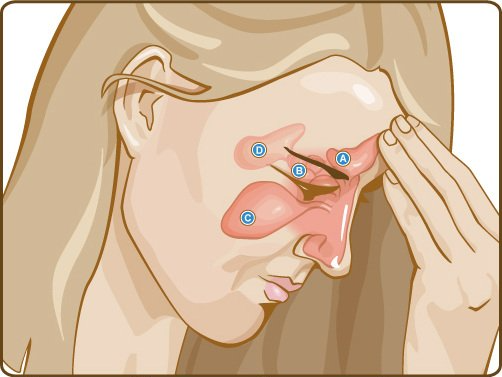Aspirin Exacerbated Respiratory Disease (AERD) Polyposis

What is AERD?
AERD or Aspirin Triad (also called Samter's Triad or Aspirin Exacerbated Respiratory Disease) is a condition characterized by chronic sinusitis with nasal polyps, asthma, and aspirin sensitivity. The medication intolerance can occur with not only aspirin, but also ibuprofen and other related "NSAID" medications. In general, it is recommended to avoid these medications if you are diagnosed with this condition. The condition is treated with medications that limit its "inflammatory reaction" and sinus surgery is often helpful. Sometimes performing "aspirin desensitization" can help in management as well. The condition is known to be difficult to manage. Dr. Thomas Higgins recommends assembling a team with multidisciplinary expertise, including rhinologist, allergist, and pulmonologist, to provide the best possible care for this condition.
Chronic Rhinosinusitis with Nasal Polyps (CRSWNP)
Aspirin Triad often presents as adult-onset severe sinus infections or asthma. Extensive polyposis is present with severe inflammation of the nose and sinuses. A combination of medicines and often
endoscopic sinus surgery are necessary to reduce symptoms and improve quality of life. The techniques used for endoscopic sinus surgery in Aspirin Triad can be intricate compared to routine chronic sinusitis. Dr. Thomas Higgins recommends the surgery be performed by an experienced surgeon used to managing Aspirin Triad as scar tissue can be more prevalent and frequent repeat surgeries may be otherwise required. Expanded endoscopic surgeries of the frontal sinus (such as the modified Lothrop procedure) may greatly reduce the likelihood of needing future surgeries.


Asthma
Asthma, often with an onset in adulthood, occurs with Aspirin Triad. As a result, a multidisciplinary approach is essential to properly manage this condition. Medical therapy to help with lung function is essential along with management of sinusitis. Aspirin Triad patient with resistant problems may benefit from a therapy called aspirin desensitization or biologic therapy such as
dupilumab (Dupixent),
mepolizumab (Nucala), or
omalizumab (Xolair).
FAQs about AERD
-
What is Aspirin-Exacerbated Respiratory Disease (AERD)?
AERD, also known as Samter’s Triad, is a chronic medical condition characterized by asthma, recurrent nasal polyps, and sensitivity to aspirin and other non-steroidal anti-inflammatory drugs (NSAIDs). Individuals with AERD experience respiratory reactions like nasal congestion, wheezing, or shortness of breath after taking these medications.
-
What are the symptoms of AERD?
Symptoms of AERD typically include asthma that is often difficult to control, chronic sinusitis, nasal polyps, and sensitivity to aspirin and other NSAIDs. Patients may also experience anosmia (loss of the sense of smell), chronic rhinosinusitis, and potential respiratory reactions to alcoholic beverages.
-
How is Aspirin-Exacerbated Respiratory Disease diagnosed?
AERD is diagnosed through a combination of medical history evaluation, physical exams, and tests. These can include nasal endoscopy, CT scans of the sinuses, asthma evaluations, and—as the definitive test—a controlled aspirin challenge in a specialized clinical setting.
-
Can AERD be treated?
Yes, AERD can be managed with various treatments. Options include aspirin desensitization, which can help reduce sensitivity to aspirin and improve sinus and asthma symptoms. Additionally, medical management may involve corticosteroids, leukotriene modifiers, monoclonal antibodies, and surgery to remove nasal polyps.
-
Are there special considerations for managing AERD?
Patients with AERD should avoid aspirin and other NSAIDs unless they have undergone aspirin desensitization. It is also essential to manage asthma and sinusitis actively to reduce complications. Patients may require ongoing care from an allergist or immunologist and an ear, nose, and throat (ENT) specialist.
-
Is Aspirin Desensitization safe for AERD patients?
Aspirin desensitization is a safe procedure for most patients with AERD when done under the supervision of an allergy specialist in a controlled environment. It involves the patient taking gradually increasing doses of aspirin until a maintenance dose is reached.
-
Can lifestyle changes help manage AERD symptoms?
Yes, lifestyle changes can help manage AERD. Avoiding aspirin and other NSAIDs, using nasal saline irrigations, adopting a healthy diet, and maintaining a clean environment free of allergens can reduce symptoms and improve quality of life.
-
Is there a cure for Aspirin-Exacerbated Respiratory Disease?
Currently, there is no cure for AERD. However, treatments such as aspirin desensitization, sinus surgery, monoclonal antibody medications, and proper management of asthma and sinusitis can significantly improve symptoms and reduce the frequency of polyp formation and sinus infections.
Our Convenient Locations
Contact Us
Have question about our services and treatments? Reach out to us!
Contact Us
Thank you for contacting us.
We will get back to you as soon as possible.
Please try again later
Schedule an Appointment with a Fellow-Trained Sinus Surgeon Today
Dr. Thomas Higgins | Dedication to Sinusitis Relief

Our Convenient Locations
Louisville Old Brownsboro Crossing
9850 Von Allmen Court, STE 104, Louisville, KY 40241
Louisville St. Matthews Springs Medical Complex
6420 Dutchmans Parkway STE 380 Louisville, KY 40205
Jeffersonville, Indiana
W Gordon Gutmann Blvd, Jeffersonville, IN 47130 USA
Dr. Thomas S. Higgins
- Rhinology, Sinus & Skull Base, Kentuckiana Ear, Nose & Throat
- Locations in Louisville, Kentucky and Southern Indiana
- Clinical Associate Professor, Department of Otolaryngology-Head and Neck Surgery and Communicative Disorders
University of Louisville School of Medicine
Copyright © 2012-2025. Higgins Sinus. All Rights Reserved.
Note: The information contained in these pages is for educational purposes only. It should not be construed as individualized diagnostic and treatment advice. Please see our Privacy Policy as well as our Terms and Conditions. While we will never intentionally share any information you provide us via this website, this contact form and email system is not secure under HIPAA guidelines. Please avoid including personal or medical information you would want to be protected from 3rd party interception. A list of HIPAA identifiers can be found here. Please do not use this form for emergent or urgent matters. Disclosure: We may earn a commission when you use one of our coupons/links to make a purchase.




